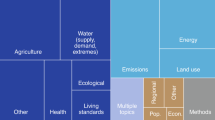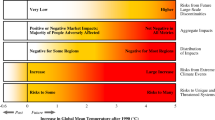Abstract
Assessments conducted by the Intergovernmental Panel on Climate Change (IPCC) are significant undertakings that require input from experts and practitioners in multiple scientific disciplines, integrating local to international information across spatial and temporal scales. An IPCC report is a unique collaboration between the scientific community and policymakers, with governments (through their Focal Points) providing guidance and input to the scientists conducting an assessment at several stages during the process. This commentary reviews the IPCC mandate and process; summarizes key themes to be addressed in the Working Group II contribution to the 5th assessment report; discusses challenges for the WGII report when assessing qualitative literature, incorporating local knowledge, and identifying particularly vulnerable groups; and touches on the expertise and commitment of the WGII authors. Active engagement of the wider scientific community in IPCC assessments through publication and review will enhance their relevance to decision- and policy-makers.
Similar content being viewed by others
References
ACIA (2005) Arctic climate impact assessment. Cambridge University Press. pp 1042
Agrawal A (2002) Indigenous knowledge and the politics of classification. In: Agrawal A (editorial advisor) Indigenous knowledge: special issue of International Social Science Journal–173. Blackwell Publishing and UNESCO. http://portal.unesco.org/science/en/ev.php-URL_ID=3520&URL_DO=DO_TOPIC&URL_SECTION=201.html; assessed 5 January 2012
Armstrong R, Waters E, Jackson N, Oliver S, Popay J, Shepherd J, Petticrew M, Anderson L, Bailie R, Brunton G, Hawe P, Kristjansson E, Naccarella L, Norris S, Pienaar E, Roberts H, Rogers W, Sowden A, Thomas H. Guidelines for systematic reviews of health promotion and public health interventions. Version 2. Melbourne University: Australia. October 2007
Brooks N, Adger WN, Kelly M (2005) The determinants of vulnerability and adaptive capacity at the national level and the implications for adaptation. Global Environ Change B 15:151–163
Deer F (2006) Research perspectives in indigenous education: the legitimacy of indigenous knowledge. http://www.win-hec.org/docs/pdfs/FrankDeer.pdf; assessed 5 January 2012
Downing TE, with Butterfield R, Cohen S, Huq S, Moss R, Rahman A, Sokona Y, Stephen L (2001) Climate change vulnerability: linking impacts and adaptation. United Nations Environment Programme, Nairobi, and Environmental Change Institute, University of Oxford, Oxford
Field CB, Barros V, Stocker TF, Qin D, Dokken D, Ebi KL, Mastrandrea MD, Mach KJ, Pattner G-K, Allen S, Tignor M, Midgley PM (2012) IPCC special report on managing the risks of extreme events and disasters to advance climate change adaptation. Cambridge University Press, Cambridge, UK and New York, NY, USA
Ford JD, Vanderbilt W, Berrang-Ford L (2011) Authorship in IPCC AR5 and its implications for content: climate change and Indigenous populations in WGII. Clim Chang. doi:10.1007/s10584-011-0350-z
Hassan R, Scholes R, Ash N (eds) (2005) Millennium ecosystem assessment. ecosystems and human well-being: current state and trends, volume 1. Island, Washington, p 917
InterAcademy Council (2010) Climate change assessments: review of the processes and procedures of the IPCC. http://reviewipcc.interacademycouncil.net/; accessed 5 January 2012
IPCC (2007) Climate change 2007: synthesis report–contribution of Working Group I, II and III to the Fourth Assessment Report of the Intergovernmental Panel on Climate Change. Intergovernmental Panel on Climate Change, Geneva
IPCC (2011) Decisions taken with respect to the review of IPCC processes and procedures: procedures. IPCC 34th Session, 18–19 November 2011, Kampala, Uganda. http://ipcc.ch/pdf/ipcc-principles/appendix_a_decision.pdf; accessed 5 January 2012
Jasanoff S, Martello ML (eds) (2004) Earthly politics: local and global in environmental governance. MIT, Cambridge
Leary N, Adejuwon J, Barros V, Burton I, Kulkarni J, Lasco R (2008a) Climate change and adaptation. Earthscan, Sterling
Leary N, Conde C, Kulkarni J, Nyong A, Pulhin J (2008b) Climate change and vulnerability. Earthscan, Sterling
McCarthy J, Canziani O, Leary N, Dokken D, White K (eds) (2001) Climate change 2001: impacts, adaptation, and vulnerability. Contribution of Working Group II to the Third Assessment Report of the Intergovernmental Panel on Climate Change. Cambridge University Press, Cambridge
McIntyre BD, Herren HR, Wakhungu J, Watson RT (eds) (2009) IAASTD: International Assessment of Agricultural Knowledge, Science and Technology for Development. Island, Washington, p 590
Parry ML, Canziani O, Palutikof JP, Hanson C, van der Linden P (eds) (2007) Climate change 2007: impacts, adaptation and vulnerability. Contribution of Working Group II to the Fourth Assessment Report of the Intergovernmental Panel on Climate Change. Cambridge University Press, New York
Prasad N, Ranghieri F, Shah F, Trohanis Z, Kessler E, Sinha R (2009) Climate resilient cities: a primer on reducing vulnerabilities to disasters. World Bank, Washington
Reid WV, Berkes F, Wilbanks T, Capistrano D (eds) (2006) Bridging scales and knowledge systems: concepts and applications in ecosystem assessment. Island, Washington, p 368
Scheraga JD, Ebi KL, Furlow J, Moreno AR (2003) From science to policy: developing responses to climate change. In: McMichael AJ, Campbell-Lendrum D, Corvalan CF, Ebi KL, Githeko A, Scheraga JD, Woodward A (eds) Climate change and human health: risks and responses.. WHO/WMO/UNEP
Smith JB, Schneider SH, Oppenheimer M, Yohe G, Hare W, Mastrandrea MD, Patwardhan A, Burton I, Corfee-Morlot J, Magadza CHD, Fussel H-M, Pittock AB, Rahman A, Suarez A, van Ypersele J-P (2009) Assessing dangerous climate change through an update of the Intergovernmental Panel on Climate Change (IPCC) “reasons for concern”. PNAS 106:4133–4137
UNFCCC (1992) United Nations Framework Convention on Climate Change. http://unfccc.int/key_documents/the_convention/items/2853.php; accessed 5 January 2012
UNISDR (2009) 2009 global assessment report on disaster risk reduction: risk and poverty in a changing climate. http://www.preventionweb.net/english/hyogo/gar/; accessed 5 January 2012
Van de Noort R (2011) Conceptualising climate change archeology. Antiquity 85:1039–1048
Acknowledgments
The author gratefully acknowledges comments from Neil Adger, Jon Barnett, Vicente Barros, Christopher Field, Michael D. Mastrandrea, Katharine Mach, Pauline Midgley, Jan Minx, Christopher von Stechow, and Thomas Wilbanks.
Author information
Authors and Affiliations
Corresponding author
Rights and permissions
About this article
Cite this article
Ebi, K.L. Key themes in the Working Group II contribution to the Intergovernmental Panel on Climate Change 5th assessment report. Climatic Change 114, 417–426 (2012). https://doi.org/10.1007/s10584-012-0442-4
Received:
Accepted:
Published:
Issue Date:
DOI: https://doi.org/10.1007/s10584-012-0442-4




